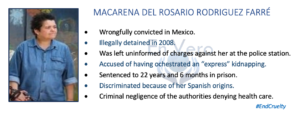Source: M Le Magazine du Monde
Author: Joëlle Stolz
December 7th, 2016 (Original publication in French on Oct. 15, 2016)
Translation: Jasmine Soso
For 7 years, Florence Cassez was France’s prisoner of Mexico. 3 years after her release, the young woman tries to rebuild herself alongside her parents in Dunkerque. A return to what was once known as normal.
“I wasn’t prepared to live through this situation. However I was definitely not prepared for getting out of it. Suddenly, there is everyone around you, but all you’re used to is the cocoon of your cell.”
Dunkerque is a calm city, facing towards the northern sea, crossed by flights of seagulls. And it has time and time again been left with scars at the price of terrible battles. A city that has often had to defend and rebuild itself. It has only been a few months since the life of Florence Cassez, formerly a prisoner in Mexico, after the whirlwind that followed her release and return to France, at the end of January 2013. Seven years of adversity, held in a Mexican jail for charges accusing her of kidnapping, where all she kept pleading for her innocence. Now 3 years after her release and freedom, to lead a life like any other woman, with a child at last, a miracle and gift for those who saw her biological clock ticking – stopped at 31 years old in December of 2005, until her release from prison at age 38. However these were three years of doubt and discouragement. It isn’t easy to face the reality of a country in crisis when we have been forcefully apart for such a long time. It isn’t easy to come back to these grounds after a story like this.
For Florence Cassez, President Nicolas Sarkozy did not hesitate to abandon the year of Mexico in France in 2011. Francois Hollande took over for the arrival of Élysée – “they were always there, they both have helped me” she stated. Upon her airplane arrival at Roissy, in 2013, the Socialist Minister of Foreign Affairs, Laurent Fabius, followed by dozens of journalists, came to greet her in person. With supporters on both sides, and a solid set of skeptics from all sides: she was a national case that transcended the partisan boundaries without having unanimity. “This Story”, she says “was not one I was ready to live through. But I certainly wasn’t ready to leave it. It’s all the more violent to relearn everything again: you don’t recognize anything, technology has changed, and suddenly there’s all these people, so many people all around you, when you have gotten used to the cocoon of your cell”.
When I find her in Dunkerque during the month of September – for the first time since we met in the prison of Tepepan, in Mexico – she still has her longline silhouette, impeccably shaped by classical dance, her cascade of red hair. Beautiful but stretched like a bow. “Stressed”, says Bernard, her father, who supported without failing with the rest of her family during the Mexican trial and today accompanies her on her return up North. Florence’s morale during this time is like a low tide. The giant wave that brought her, with its flood of foam and sequins reflecting, and left her in the sand. She just left her husband Fausto, a French-Mexican who had taken her to live in Annecy. Their daughter, Fleur, was born in February of 2015. This unity with such an attentive man does her good, even if she knows she decided very quick, “15 days after my release, I was on my way to be with him”. The desire to catch up with her life as an adult which had been frustrated by her years being detained, she always wanted to be independent, having quit school at 16 years old to enter the real world, having brushed off the wise advice from those close to her.
Now returning to the same space she had rarely avoided, even if living in the same house as her parents has its advantages, while raising a young child: her father and mother, Charlotte, are always there to lend her a hand. Their neighbourhood with the spectacular pointed roofs, which resemble those of the Hanseatic Ports, is called Le Grand Large, it was built near the sea, where the former shipyards can be found. In the North, Florence Cassez is at her home. “Welcome to your city” proclaimed the signs that the Mayor of Dunkerque, at the time, the socialist Michel Delabarre, had posted in the streets after her release. In Lille, where she was born, in Bethune, where she lived, and in Calais and Roubaix, where she had worked. Just by her last name, which finishes with a ‘z’, instead of an ‘r’, marks the former Spanish rule over Flandres, it is rooted in this region of Haut-de-France where solidarity lies in strong values.
However the comfort of being in a familiar environment, doesn’t resolve her most crucial problem, finding a job. Self-taught, she had been very young when without a diploma, she climbed the hierarchy of the store Eurodif de Calais until she was in the right direction to be recruited by a head hunter who would offer double her salary at H&M in Roubaix – before refusing a promotion and closing the door. It was in that moment, in 2003, that she decided to join her brother Sebastien, in Mexico, who had a wife, two children and a small commercial enterprise there. Without any doubt that this engaging country would become a trap for her.
Today, she thinks back again on the lost time, “In my head, I’m still 30 years old, the same desires, the same ambition to advance that you can have at 30 years old. But, for others, I’m 41. That is what’s difficult, this offset. Seven years of my life was stolen from me”. Nevertheless, after a fair share of disappointments, she was offered a position at Pole emploi, contacting the unemployed. The distress and desire to get away, the discouragement that cuts your wings when the doors are close, who else could better understand them?
It’s been three years, passing the euphoria of the first months in freedom, disillusioning the fact that this exceptional story, deserved it. “They made a hero out of me, almost like a saint. Suddenly, when I was out, the charm was gone. I saw it in people’s eyes that I wasn’t everything that they imagined me to be”. She admires the courage of her brother Sébastien, who was now in the South after being a the target of intimidation in Mexico, and has had more than 40 years of studying nursing, at the same time as his commitment to volunteer firefighting. He always “wanted to help other people”, she says about of him, considering him more like a twin, even if she has a close relationship with their elders. She made it very clear in repeating she won’t be stepping foot back in Mexico, “never”, she insisted, “even if les offered all the honors”, there are details in her apartment, like small colorful pictures hung up on the walls, which remind her of the country. There is also Flower, her daughter, who is also that of Fausto: matte looking skin, and black hair, “mas Mexicana que el pulque” (“more Mexican than pulque”), is what they say there, talking about the ancient Aztecs drink, partly fermented with pulp from agave.
She prefers to keep her distance, but Mexico won’t forget her either. “A part of the Mexican society interpreted the case of Florence Cassez like a school incident that should never be repeated”, explained over the phone by Montréal philosopher, David Bertet, president of L’Association Canadienne pour le droit et la vérité (ACDV) (Canadian Association for Rights and Truth), who has been interested since the beginning of this case. Lessons can be learned at the nationally autonomous University of Mexico and in other prestigious faculties, to underline the absolute priority of complying with the procedural rules – le debido proceso – and fundamental rights.
Since 2010, there exists the blog “Mexico for Florence Cassez”, subtitled “Let’s fight together against the making of culprits in Mexico”. The juror Manuel Alejandro Vasquez analysed the case in a book ‘El Caso Florence Cassez’ (not translated), while Supreme Court Judge, Olga Sanchez Cordero, presented it in a conference in 2014, as a ‘paradigmatic case’. This legal posterity, whereas she had to respond so often to the same injunction: “Explain to me why you’re not guilty”, “Pleases me to”, says Florence Cassez today. Each Mexican journalist, who swayed from side to side – such as Alfredo Méndez, of the Left Wing daily La Jornada, or Héctor de Mauleon, whose article in the journal Nexos marked a turning point of the perception of the case based on public opinion – adding a stone to the slow rebuilding of self-esteem, after the initial disaster: “One morning, I woke up and the whole world, except my parents, believed I was guilty”. One of the most widely discussed work in 2015, was one from a Belgian journalist, who had long been in the country. In El Teatro del Engaño(The Lying Theater, not translated), devoted to so called accomplices of Florence Cassez, members of the supposed group of the Zodiac, Emmanuelle Steels demonstrated that this group was a pure invention of the police. This work has made all the more noise as it has enlightened the faith of the former friend of the French, Israel Vallarta: almost eleven years after the arrest, he has still never been before a judge, and has stayed locked in a high security penitentiary establishment, while two of his brothers and three of his cousins were embezzled on the basis of confessions extracted under torture.
“That was very difficult, to contact the Vallarta family” tells Canadian David Bertet, “was so wounded and was mistrusting of everybody”. However the jurists, who were following the case had already succeeded in freeing her, in the spring of 2016, the other two nephews of Vallarta still being held. “Now, we will go the Israel’s brothers, Mario and René. Each liberation reinforces the chances that he as well will finally be let out of prison. When we reach the end of this, it will be such a relief for Florence”, says Bertet, who’s convinced that the Vallarta’s, like the young woman, were also victims of the setup orchestrated by the previous Minister of Security under the era of president Felipe Calderon, Genaro Garcia Luna.
The latter having admitted to having staged a couple of arrests for television, in order to promote the effectiveness of its services in the fight against crime. He never after pardoned the French woman for having exposed him directly on television while in preventive detention: In 2008, Florence Cassez was convicted to 96 years in prison, this sentence was reduced to 60 years a year later, the administration covering the manipulation through national pride. From the point of view of Europe, this seemed worthy of the Count of Monte-Cristo. In Mexico, it’s possible.
The Machiavellian American series “House of Cards, beside Mexico, is the Little Red Riding Hood”, commented Anne-Marie Mergier, of the weekly Proceso.
Victim of a judicial error, Florence Cassez wanted her liberation to “to something for other people”. It was then that the idea of questionings, for programs produced by Mélissa Theuriau, former M6, four men convicted by the French Courts, before being found innocent after their trial was reviewed. Two are notable, Christian Iacono and Jean-Louis Muller, the other two Loic Sécher and Brahim El Jabri, come from popular backgrounds. It was them who confided in her, it was because she knew, like them, that the defilement of false accusation, was hard to erase after.
Mélissa Theuriau is part of the tens of journalists who have developed a friendship with Florence Cassez that goes well beyond professional relationships when she was detained, those “who never let me go” she says. The remarkable series ‘Dans Les Yeux de Florence’ was released in the spring of 2016 through the encrypted channel Planète +. The journalist admires Florence’s “mental strength”. “I advised her, after her release, to not be damaged while being on all the television stages. She was able to get out of this whirlwind at the right time”. Both while preparing a new series, devoted to women who have emerged from a situation of family violence, come to help Moroccan Brahim El Jabri, still without a residency permit or compensation despite the thirteen years wrongfully spent behind bars. The risk of being deported at any moment back to Morocco, when her family is living in France, haunts the former prisoner.
Florence Cassez’ Mexican lawyer, Agustin Acosta, who with Frank Berton, Bar of Lille star, who has fought relentlessly for her freedom, requested on his behalf the damages and interests of Mexico. “But” she specified, “All that I want, is for my innocence to be recognized. Rather than the State of Mexico, I would find it normal that Calderon et Garcia Luna be condemned to pay me money”. She has also filed a complaint in front of the French Justice for arbitrary detention and torture, against the Mexicans responsible for her incarceration, explained Professor Sophie Thonon-Wesfreid, specialist in the infringement of human rights in Latin America. However the procedure is bogged down, “I always doubted that diplomacy and commerce do not prevail over the search for the truth”, continued the lawyer. Once Florence was free, Paris and Mexico were eager to turn the page on the “Cassez Case”.
This case will however return, in the form of a film that is set to be produced in 2017, with cinematographer, Fred Garson, former assistant of Luc Besson. Titled La Française, it will be concentrated on the seven years in captivity and the fight of the young woman against Garcia Luna. “It is Florence’s nature that put her in prison, and her nature, in its animal form, the spontaneity, but also her capacity to analyze, which allowed it to emerge”, summarizes the producer, Benoit Jaubert. The location for shooting is not yet fixed, but one thing is for sure, it’s not going to be in Mexico. “We’re not crazy” says Jaubert, “For 90% of Mexicans, she remains guilty”.




